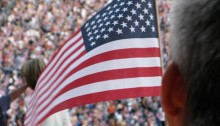DAVIEL LAZURE VIEIRA
While there might not be many surprises coming out of the Republican and Democratic National Conventions taking place this July, as the candidates for both parties had already been established, the dramatic tone emerging is a strong indication of what’s to come in the next few months as the U.S. electoral campaign unfolds. For Ron Pruessen, who served as the Munk School’s Director for International Partnerships and Research, now affiliated faculty with the Centre for the Study of the United States, it is worth pausing to consider the reasons why such angry messages are appealing to some American people. Donald Trump’s fiery speeches and the deep internal divisions within American political parties, as recently demonstrated by the Democratic National Convention (DNC) email scandal and the resignation of DNC Chairwoman Debbie Wasserman Schultz, seem to indicate that the tone of the 2016 election will be notably different from previous presidential races.
In a series of blog posts published on the London School of Economics’ U.S. Centre website, Pruessen analyzes how frustration has become a powerful force in the United States of 2016. “It’s tempting to be mostly amused by 2016’s ‘house of mad’ spectacle – to even kind of relish it in the way we might enjoy a two-hour horror movie,” he writes. “But the fury boiling away in this election season deserves to be taken more seriously.”
After multiple American military operations abroad that have exhausted the country both militarily and economically, a global financial crisis whose containment didn’t put an end to what many perceive as the pervasive influence of Wall Street on American politics, and growing tensions all across the nation on issues such as gun control and race, it’s easy to understand the lure of Donald Trump’s war over “political correctness,” or even Bernie Sanders’ “political revolution” directed against the big banks, according to Pruessen. Despite Obama’s achievements over the last decade, the constant opposition he faced from Congress laid bare the dysfunctionalities of the American system. Pruessen believes that’s perhaps why the 2016 U.S. campaign is less likely to be another “hope and vision” election: “The Cleveland convention made it clear that one script will be especially favoured: prodding fear and/or anger to summon up adrenalin.”
Not that it’s a new technique. As Pruessen notes, the “fear/anger/adrenalin formula” has enjoyed popular support throughout American history, whether during the McCarthy era when the fear of communism was at its peak, or when conservatives sought to give a voice to the “silent majority” under Nixon against antiwar protests and the hippie movement. He suggests a return of the “paranoid style in American politics,” the result of collective traumas like 9/11 that cause irrepressible anxieties and might lead voters to fall into the trap of ethnocentrism, blaming immigrants and racial, ethnic, or religious minorities for all their woes. By studying the language used by candidates during the 2016 American election, Pruessen reminds us that drawing the connection between the anger of a candidate like Trump, someone “who’s filling all the seats at the circus,” and the real frustration of Americans who have grown tired of the spectacle of their own domestic politics, is of utmost necessity if we want to grasp what’s at stake this coming November.
July 27, 2016
